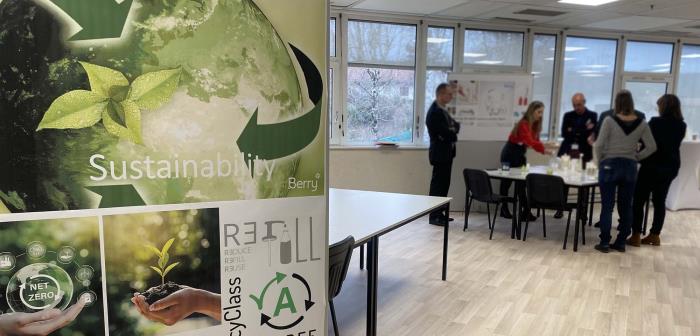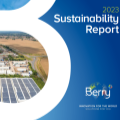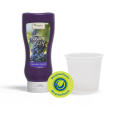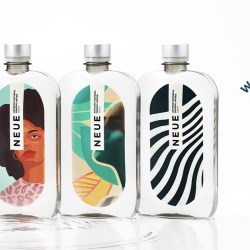

- Customer collaboration will be at the heart of developing circular packaging solutions for the beauty sector, says Elodie Roger, VP Sales, Personal Care for Berry Global CPI
Image is central to the beauty and cosmetics sector. Whatever the price point, beauty products are about luxury and indulgence. Indeed, in straitened times – and the cost of living is very much in the headlines currently – consumers tend to gravitate to smaller luxuries and away from the big-ticket items, as a means of cheering themselves up. This is the so-called ‘lipstick effect’, which can be traced back to the Great Depression in the US in 1930s, where industrial production halved but cosmetics sales rose.
Packaging plays a key role in establishing the right image for a beauty product by creating effective on-shelf impact and conveying brand values. Additionally, in today’s environmentally conscious world, consumers are demanding pack formats with sustainable benefits, and legislators are establishing environmental standards around recyclability, recycled material inclusion and material bans.
Sustainability Pledges
In response to evolving sustainability demands, many leading beauty brands now devote large sections of their websites to their sustainability objectives and commitments. And these are by no means merely paying lip-service to the cause. Their commitments come with publicly stated goals and accountability through membership and collaboration with organisations such as the Ellen MacArthur Foundation and RE100.
Still, beauty packaging must also cater to product protection and brand image. Manufacturers and their packaging suppliers therefore face the challenge of combining aesthetics and sustainability – not forgetting that any pack solution must also be functional and user-friendly.
Partnerships to Drive Change
Partnerships are becoming increasingly critical for achieving sustainability goals. No individual company or person can achieve the broad sweeping changes required to accelerate a circular, net-zero economy. These changes can be quicker, bolder, and have greater impact when we collaborate across the entire value chain to meet and hopefully exceed shared sustainability commitments.
This was one of the driving forces behind our decision to hold a series of customer Sustainability in Beauty Days across several of our European beauty factories. The objective was to create an open forum that would enable a team of design and material science experts across the industry to listen to our customers’ most important business challenges in beauty packaging and, together, navigate the complexity behind new pack development. This helps us all to ‘speak the same language’ when it comes to sustainability goals.
Sustainability in Beauty Days are part of Berry’s ‘More Together’ initiative, where we believe individuals can most effectively drive change using their personal passions for the environment. The days create an open table environment where key stakeholders, including competing companies, can come together in the same room to address the urgency of the world’s commitment to achieve a net-zero future. By encouraging transparent communication and allowing participants to share their expertise and experiences, these sessions are critical to delivering circular solutions.
The challenge of balancing different needs and priorities, such as functionality, convenience, brand image and product protection, is one that pack designers and manufacturers face daily. This was reinforced by various creative processes during the Sustainability in Beauty Days, including a reverse role-playing exercise where individuals were asked to take another seat at the table to help improve collaboration.
Legislation as a Uniting Force
Sustainability in Beauty Days also united participants by addressing the reality of impending legislation, in particular the implications of the Packaging and Packaging Waste Regulation (PPWR) that is currently being shaped by the EU. Recognizing the challenge of keeping up with the progression and changes of PPWR amid the pressures of daily commercial life, the Sustainability in Beauty Days allowed participants to focus on the evolving legislative landscape while creating a space to reground in key design principles.
Understanding and Acting on PPWR
Some of the key areas of PPWR we discussed in our workshops include:
- Packaging minimisation to ensure a pack is not oversized in relation to its contents
- The restricted use of some pack formats and materials
- Targets for the adoption of reuse and refill systems
- Recyclability requirements for packs
- Specified minimum recycled content in packs
Such considerations are already part of the new pack development process. When it comes to the recyclability of packs, for example, Berry has long championed the development of mono-material solutions that help facilitate recycling, and we were early adopters of the use of recycled content alongside virgin material in the production of new packs.
The PPWR legislation helps highlight how wide-ranging sustainability initiatives for packaging can be. Recyclability and recycled content may often be the first things that spring to mind when thinking about sustainable packaging – certainly for many consumers - but there are other ways in which a pack can deliver sustainability benefits. These include lightweighting to reduce the use of materials and developing packs suitable for refill, reuse, or repurposing.
Evaluating Sustainability Impacts Throughout the Supply Chain
It is also important to consider the wider implications of pack manufacturing. A life cycle analysis (LCA) measures the environmental impact of a product or service throughout its life cycle, from the resources used to create the product or service to its usage and end-of-life destination.
An LCA measures the environmental impacts of each of these distinct parts, such as energy used in production, fuel used in transport, deforestation, and end-of-life ecological costs. This allows for effective comparisons between products, materials, and methods, and provides useful information for making decisions that could help the environment.
During our Sustainability in Beauty Days, we evaluated the many initiatives we are undertaking to minimise the environmental impact of our operations and how they can impact the sustainability performance of the packs we produce for customers.
Multi-Faceted Solutions
The different approaches to achieving sustainability are important for our customers - each product requires an individual approach. For example, a new range of natural cosmetics might require a pack made from recycled plastic to match the brand’s image.
For more high-end cosmetics, where premium positioning and on-shelf appeal are essential, there may be a greater requirement for eye-catching decoration and finishes. We are taking action to help customers reduce the environmental impact of this type of packaging by offering refillable solutions that help enhance brand loyalty and leveraging our decoration services to design with end-of-life recyclability considerations.
We have also changed the base polymers used in our electroplating process from styrene to polypropylene and removed several additives to reduce the environmental impact of the process without compromising on aesthetics.
Whatever the decoration option selected, it will form part of the complete pack that is then assessed for RecyClass classification.
During the Sustainability in Beauty Days, we highlighted examples of both B Circular Solutions that address the proposed changes from the PPWR and future innovations to help make potentially non-acceptable pack formats compliant under these new regulations. For example, double wall jars, which provide a heavier weight pack to help emphasise brand image for premium products, may not be an acceptable format under the legislation. However, making the inner sector refillable could overcome this by providing a reusable format that maintains a brand’s quality positioning.
Much of this development work is encapsulated in our B Circular Range of solutions with enhancements such as the incorporation of recycled plastic, improved recyclability, refill and reuse, and reduced carbon footprint.*
Ongoing Initiatives
To help give plastic multiple lives, our new, best-in-class UK-based Leamington Spa recycling facility allows Berry to offer the UK’s first domestically recovered, mechanically recycled, and contact-sensitive recycled plastic at scale, which helps to close the loop for beauty and personal care applications.
Using our proprietary closed-loop CleanStream® recycling technology, this new facility is able to produce lower-carbon, contact-sensitive recycled plastic. Replacing simple, material-based sorting with multiple sorting steps, the technology delivers ultra-high levels of polymer purity through proprietary artificial intelligence-based product identification, an upgraded decontamination process, and custom-made extraction and screening tests.
CleanStream® recycled PP has been extensively tested across a range of products and processes to ensure it meets the rigorous standards for food contact safety, including no odour or taint, and low migration. The technology has been granted a Letter of No Objection (LNO) from the U.S. Food & Drug Administration (FDA), which confirms that the PCR PP produced by the process can be used in levels up to 100% for food-grade applications.**
Berry is also continuing to work on other new material compositions such as ones derived from algae.
Moving Forward Together
Our Sustainability in Beauty Days were a very positive experience, which we hope to continue in the future. The days demonstrated our customers’ commitments to continuing to develop circular solutions and created an opportunity to understand the unique requirements of each brand owner.
Collaborative processes such as these enable us to contribute our expertise early in the development process rather than at the end of the procurement process, where, in many cases, Berry plays the role of a supplier. Driving circularity at scale requires all experts at the table, challenging each other to become consultants to the business and environmental opportunity ahead.
Contact Berry Global to learn about about our More Together initiative.
* Versus previous generation of Berry product.
** Berry has obtained a letter of no objection from the FDA and is targeting European Food Safety Authority (EFSA) approval. References to ‘food grade’ throughout this article should be understood accordingly.














































